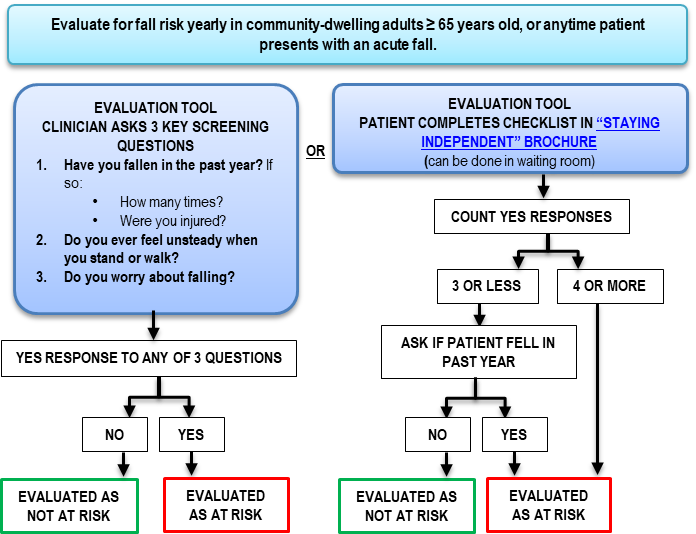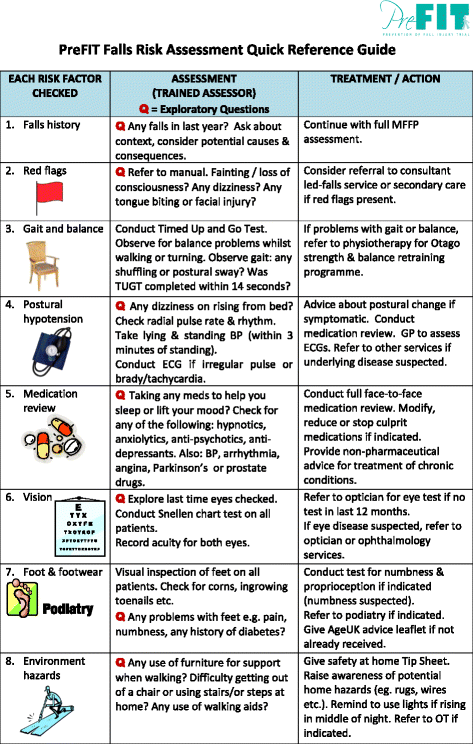See This Report on Dementia Fall Risk
Table of ContentsDementia Fall Risk for DummiesThe 7-Minute Rule for Dementia Fall RiskDementia Fall Risk - An OverviewThe 45-Second Trick For Dementia Fall Risk
A fall risk evaluation checks to see just how likely it is that you will drop. The analysis generally includes: This includes a collection of concerns regarding your general health and if you've had previous falls or problems with equilibrium, standing, and/or walking.Treatments are recommendations that may minimize your threat of dropping. STEADI includes three steps: you for your danger of dropping for your threat aspects that can be enhanced to try to avoid falls (for example, balance troubles, impaired vision) to reduce your risk of falling by utilizing efficient approaches (for instance, supplying education and resources), you may be asked a number of concerns consisting of: Have you dropped in the past year? Are you fretted about falling?
If it takes you 12 seconds or even more, it might imply you are at higher danger for a loss. This examination checks toughness and equilibrium.
The settings will obtain more challenging as you go. Stand with your feet side-by-side. Move one foot midway ahead, so the instep is touching the large toe of your various other foot. Move one foot fully in front of the various other, so the toes are touching the heel of your other foot.
5 Simple Techniques For Dementia Fall Risk
The majority of falls take place as an outcome of multiple contributing factors; consequently, handling the threat of dropping starts with recognizing the elements that add to drop risk - Dementia Fall Risk. Some of the most pertinent threat elements include: History of prior fallsChronic medical conditionsAcute illnessImpaired stride and balance, reduced extremity weaknessCognitive impairmentChanges in visionCertain high-risk medicines and polypharmacyEnvironmental variables can likewise enhance the threat for drops, consisting of: Insufficient lightingUneven or damaged flooringWet or slippery floorsMissing or damaged handrails and get hold of barsDamaged or improperly fitted equipment, such as beds, mobility devices, or walkersImproper use assistive devicesInadequate supervision of individuals staying in the NF, consisting of those that show aggressive behaviorsA effective loss threat monitoring program calls for a comprehensive professional assessment, with input from all participants of the interdisciplinary team

The care plan ought to likewise include interventions that are system-based, such as those that promote a safe atmosphere (ideal lighting, hand rails, grab bars, and so on). The performance of the treatments ought to be evaluated occasionally, and the treatment plan revised as needed to show modifications in the fall threat assessment. Executing a fall danger management system using evidence-based ideal practice can lower the occurrence of drops in the NF, while restricting the capacity for fall-related injuries.
Dementia Fall Risk Can Be Fun For Everyone
The AGS/BGS standard recommends evaluating all grownups matured 65 years and older for autumn risk each year. This testing contains asking individuals whether they have dropped 2 or even more times in the previous year or looked for clinical interest for a loss, or, if they have not dropped, whether they feel unsteady when strolling.
People that have fallen as soon as without injury ought to have their equilibrium and stride evaluated; those with gait or balance read the article abnormalities ought to receive extra evaluation. A background of 1 fall without injury and without stride or balance troubles does not warrant additional evaluation beyond continued yearly fall risk screening. Dementia Fall Risk. An autumn risk assessment is required as component of the Welcome to Medicare examination

The Facts About Dementia Fall Risk Uncovered
Documenting a falls history is among the high quality signs for autumn avoidance and administration. An essential component of risk assessment is a medication testimonial. Numerous classes of medicines increase autumn risk (Table 2). Psychoactive drugs in specific are independent predictors of falls. These medicines tend to be sedating, alter the sensorium, and hinder balance and stride.
Postural hypotension can frequently be alleviated by lowering the dose of next blood pressurelowering drugs and/or stopping drugs that have orthostatic hypotension as an adverse effects. you could try this out Usage of above-the-knee assistance pipe and resting with the head of the bed raised may also lower postural reductions in high blood pressure. The advisable elements of a fall-focused checkup are received Box 1.

A Pull time better than or equivalent to 12 seconds suggests high autumn threat. Being incapable to stand up from a chair of knee elevation without making use of one's arms indicates enhanced loss danger.